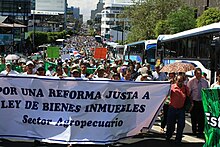International comparisons of trade unions
Unions have been compared across countries by growth and decline patterns, by violence levels, and by kinds of political activity.
[11] According to the historian M. Dreyfus, the direction of the CGT is slowly evolving, since the 1990s, during which it cut all organic links with the Communist Party, in favour of a more moderate stance.
It is the largest French trade union confederation by number of members (875,000) but comes only second after the Confédération générale du travail (CGT) in voting results for representative bodies.
The CFDT was created in 1964 when a majority of the members of the Christian trade union Confédération Française des Travailleurs Chrétiens (CFTC) decided to become secular.
[13] Until 1945, however, the labour movement remained weak, impeded by lack of legal rights,[14] anti-union legislation,[13] management-organized factory councils, and political divisions between “cooperative” and radical unionists.
[15] In the immediate aftermath of the Second World War, the US Occupation authorities initially encouraged the formation of independent unions.
[14] Legislation was passed that enshrined the right to organize, and membership rapidly rose to 5 million by February 1947.
[27] By 1913, the first International Workers Day was celebrated and unions, supported in particular by the Popular Vanguard Party,[27] pushed for Alfredo González Flores' tax reforms.
[27] Head of state Teodoro Picado Michalski violently repressed union leaders, leading to the tensions that created the 1948 Costa Rican Civil War.
[27] Labor unions continued to grow, supported by the Catholic church, and the first collective bargaining agreement was reached in 1967.
[30] During the 2007 Central American Free Trade Agreement referendum, labor unions unsuccessfully organized to encourage its rejection.
[31] They received a boost in political influence when Luis Guillermo Solís and his Citizens' Action Party earned the Presidency and several seats in the Legislative Assembly.
[34] Former president Laura Chinchilla vetoed it, but Solís appears to want the issue passed, as do many members of the Legislative Assembly.
[37][38] Between 1877 and 1968, American state and federal troops intervened in labor disputes more than 160 times, almost invariably on behalf of employers.

